[English] 日本語
 Yorodumi
Yorodumi- PDB-1q68: Solution structure of T-cell surface glycoprotein CD4 and Proto-o... -
+ Open data
Open data
- Basic information
Basic information
| Entry | Database: PDB / ID: 1q68 | ||||||
|---|---|---|---|---|---|---|---|
| Title | Solution structure of T-cell surface glycoprotein CD4 and Proto-oncogene tyrosine-protein kinase LCK fragments | ||||||
 Components Components |
| ||||||
 Keywords Keywords | MEMBRANE PROTEIN/TRANSFERASE / Peptide-peptide complex / helix-helix interaction / zinc coordination / beta hairpin / MEMBRANE PROTEIN-TRANSFERASE COMPLEX | ||||||
| Function / homology |  Function and homology information Function and homology informationregulation of lymphocyte activation / positive regulation of leukocyte cell-cell adhesion / CD27 signaling pathway / helper T cell enhancement of adaptive immune response / interleukin-16 binding / interleukin-16 receptor activity / maintenance of protein location in cell / response to methamphetamine hydrochloride / cellular response to ionomycin / regulation of regulatory T cell differentiation ...regulation of lymphocyte activation / positive regulation of leukocyte cell-cell adhesion / CD27 signaling pathway / helper T cell enhancement of adaptive immune response / interleukin-16 binding / interleukin-16 receptor activity / maintenance of protein location in cell / response to methamphetamine hydrochloride / cellular response to ionomycin / regulation of regulatory T cell differentiation / T cell selection / gamma-delta T cell differentiation / positive regulation of gamma-delta T cell differentiation / Fc-gamma receptor signaling pathway / MHC class II protein binding / positive regulation of kinase activity / FLT3 signaling through SRC family kinases / cellular response to granulocyte macrophage colony-stimulating factor stimulus / interleukin-15-mediated signaling pathway / protein antigen binding / positive regulation of monocyte differentiation / Alpha-defensins / Nef Mediated CD4 Down-regulation / intracellular zinc ion homeostasis / positive regulation of heterotypic cell-cell adhesion / CD4 receptor binding / Nef and signal transduction / Co-stimulation by CD28 / Interleukin-2 signaling / CD28 dependent Vav1 pathway / regulation of T cell activation / response to vitamin D / peptidyl-tyrosine autophosphorylation / extracellular matrix structural constituent / Other interleukin signaling / Regulation of KIT signaling / leukocyte migration / phospholipase activator activity / Co-inhibition by CTLA4 / T cell receptor complex / enzyme-linked receptor protein signaling pathway / CD8 receptor binding / Translocation of ZAP-70 to Immunological synapse / Phosphorylation of CD3 and TCR zeta chains / pericentriolar material / protein serine/threonine phosphatase activity / PECAM1 interactions / positive regulation of protein kinase activity / positive regulation of T cell receptor signaling pathway / hemopoiesis / regulation of calcium ion transport / macrophage differentiation / Generation of second messenger molecules / positive regulation of calcium ion transport into cytosol / immunoglobulin binding / RHOH GTPase cycle / T cell differentiation / immunological synapse / Co-inhibition by PD-1 / CD28 dependent PI3K/Akt signaling / Binding and entry of HIV virion / T cell receptor binding / phosphatidylinositol 3-kinase binding / coreceptor activity / GPVI-mediated activation cascade / phospholipase binding / T cell costimulation / positive regulation of intrinsic apoptotic signaling pathway / phosphotyrosine residue binding / release of sequestered calcium ion into cytosol / positive regulation of calcium-mediated signaling / positive regulation of interleukin-2 production / positive regulation of T cell proliferation / SH2 domain binding / peptidyl-tyrosine phosphorylation / cell surface receptor protein tyrosine kinase signaling pathway / protein tyrosine kinase binding / Signaling by phosphorylated juxtamembrane, extracellular and kinase domain KIT mutants / T cell activation / B cell receptor signaling pathway / non-membrane spanning protein tyrosine kinase activity / non-specific protein-tyrosine kinase / Vpu mediated degradation of CD4 / clathrin-coated endocytic vesicle membrane / calcium-mediated signaling / Signaling by SCF-KIT / platelet activation / positive regulation of protein phosphorylation / positive regulation of T cell activation / Constitutive Signaling by Aberrant PI3K in Cancer / cell-cell junction / transmembrane signaling receptor activity / DAP12 signaling / MHC class II protein complex binding / response to estradiol / Downstream TCR signaling / PIP3 activates AKT signaling / Cargo recognition for clathrin-mediated endocytosis / T cell receptor signaling pathway / signaling receptor activity Similarity search - Function | ||||||
| Biological species |  Homo sapiens (human) Homo sapiens (human) | ||||||
| Method | SOLUTION NMR / distance geometry, simulated annealing, molecular dynamics, torsion angle dynamics | ||||||
 Authors Authors | Kim, P.W. / Sun, Z.Y. / Blacklow, S.C. / Wagner, G. / Eck, M.J. | ||||||
 Citation Citation |  Journal: Science / Year: 2003 Journal: Science / Year: 2003Title: A zinc clasp structure tethers Lck to T cell coreceptors CD4 and CD8. Authors: Kim, P.W. / Sun, Z.Y. / Blacklow, S.C. / Wagner, G. / Eck, M.J. | ||||||
| History |
|
- Structure visualization
Structure visualization
| Structure viewer | Molecule:  Molmil Molmil Jmol/JSmol Jmol/JSmol |
|---|
- Downloads & links
Downloads & links
- Download
Download
| PDBx/mmCIF format |  1q68.cif.gz 1q68.cif.gz | 226.2 KB | Display |  PDBx/mmCIF format PDBx/mmCIF format |
|---|---|---|---|---|
| PDB format |  pdb1q68.ent.gz pdb1q68.ent.gz | 185.4 KB | Display |  PDB format PDB format |
| PDBx/mmJSON format |  1q68.json.gz 1q68.json.gz | Tree view |  PDBx/mmJSON format PDBx/mmJSON format | |
| Others |  Other downloads Other downloads |
-Validation report
| Arichive directory |  https://data.pdbj.org/pub/pdb/validation_reports/q6/1q68 https://data.pdbj.org/pub/pdb/validation_reports/q6/1q68 ftp://data.pdbj.org/pub/pdb/validation_reports/q6/1q68 ftp://data.pdbj.org/pub/pdb/validation_reports/q6/1q68 | HTTPS FTP |
|---|
-Related structure data
- Links
Links
- Assembly
Assembly
| Deposited unit | 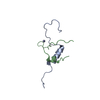
| |||||||||
|---|---|---|---|---|---|---|---|---|---|---|
| 1 |
| |||||||||
| NMR ensembles |
|
- Components
Components
| #1: Protein/peptide | Mass: 4693.604 Da / Num. of mol.: 1 / Fragment: residues 421-458 / Mutation: M407L Source method: isolated from a genetically manipulated source Source: (gene. exp.)  Homo sapiens (human) / Gene: CD4 / Plasmid: pMM / Species (production host): Escherichia coli / Production host: Homo sapiens (human) / Gene: CD4 / Plasmid: pMM / Species (production host): Escherichia coli / Production host:  |
|---|---|
| #2: Protein/peptide | Mass: 3299.578 Da / Num. of mol.: 1 / Fragment: residues 6-34 / Mutation: M14L Source method: isolated from a genetically manipulated source Source: (gene. exp.)  Homo sapiens (human) / Gene: LCK / Plasmid: pMM / Species (production host): Escherichia coli / Production host: Homo sapiens (human) / Gene: LCK / Plasmid: pMM / Species (production host): Escherichia coli / Production host:  |
| #3: Chemical | ChemComp-ZN / |
-Experimental details
-Experiment
| Experiment | Method: SOLUTION NMR | ||||||||||||||||||||
|---|---|---|---|---|---|---|---|---|---|---|---|---|---|---|---|---|---|---|---|---|---|
| NMR experiment |
|
- Sample preparation
Sample preparation
| Details |
| |||||||||||||||
|---|---|---|---|---|---|---|---|---|---|---|---|---|---|---|---|---|
| Sample conditions | pH: 5.1 / Pressure: ambient / Temperature: 298 K | |||||||||||||||
| Crystal grow | *PLUS Method: other / Details: NMR |
-NMR measurement
| Radiation | Protocol: SINGLE WAVELENGTH / Monochromatic (M) / Laue (L): M | |||||||||||||||
|---|---|---|---|---|---|---|---|---|---|---|---|---|---|---|---|---|
| Radiation wavelength | Relative weight: 1 | |||||||||||||||
| NMR spectrometer |
|
- Processing
Processing
| NMR software |
| |||||||||||||||
|---|---|---|---|---|---|---|---|---|---|---|---|---|---|---|---|---|
| Refinement | Method: distance geometry, simulated annealing, molecular dynamics, torsion angle dynamics Software ordinal: 1 Details: The structures are based on a total of 419 distance restraints (406 NOEs, four Zn-S restraints from Cd-H HMQC experiments, nine hydrogen bonds) and 63 angle restraints (57 dihedral angle ...Details: The structures are based on a total of 419 distance restraints (406 NOEs, four Zn-S restraints from Cd-H HMQC experiments, nine hydrogen bonds) and 63 angle restraints (57 dihedral angle restraints, six S-Zn-S angle restraints from Cd-H HMQC experiments). | |||||||||||||||
| NMR representative | Selection criteria: noe limit 0.5 angstrom, angle violation 5 degrees | |||||||||||||||
| NMR ensemble | Conformer selection criteria: The submitted conformer models are the 10 structures with the lowest energy. Conformers calculated total number: 100 / Conformers submitted total number: 10 |
 Movie
Movie Controller
Controller



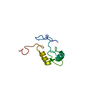
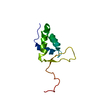

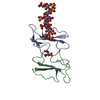
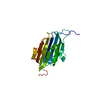
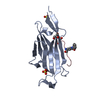
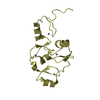
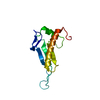
 PDBj
PDBj

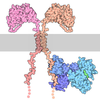



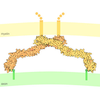




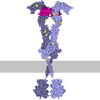
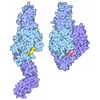

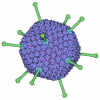
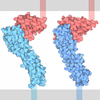
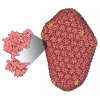
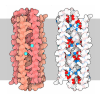
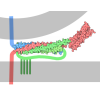


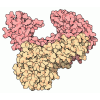
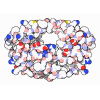

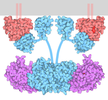


 HNCA
HNCA